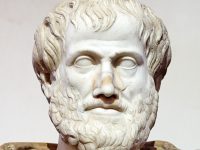 |
||
|
Recent years have witnessed a revival of the debate concerning natural law or natural justice, which suggests that laws, or at least the basic principles (foundations and limits) of social, political and legal order, should be derived from human nature. The key point is the notion that human dignity is the differential boundary. The article presents some arguments countering this position and more specifically of the prejudice implied by supposing dignity to be a feature unique to human beings. Under the protection of certain bioethical developments taking place in Christian fundamentalist sectors, we are witnessing an offensive to recover the natural law argument, which suggests that laws or at least the basic principles (foundations and limits) of social, legal and political order should be construed from human nature (and even from nature as a work of creation). The key notion would be of human dignity as a differential barrier. I would like to present some arguments against this position and particularly the prejudice implied by the notion that dignity is a feature unique to human beings, from the viewpoint that nature is a continuum, as inferred from Darwin’s evolutionary concept. A doctrinal line with strong Anglo-American roots, and which has a lot to do with the position held by Peter Singer on the issue, discusses the basis and usefulness of formulating dignity as a principle and in particular argues against, as does Singer himself, the fact that philosophy and ethics commonly resorts to «pompous-sounding phrases like “dignity inherent to the human individual”, based on the specific superiority of human nature». We should recall that Singer (2003) denies the notion of dignity as an «intrinsic value of all mankind as if men possessed a value that other creatures do not». As Javier Sádaba (2006) has explained in his reflections concerning the use of dialysis in a work on the Limitation of Therapeutic Efforts (LTE)1, «the accumulation of words (dignity, freedom, autonomy) in terms of mutual reinforcement. Remind us a little of emotivism: we choose very highly-charged emotive terms, and we put them together and we have achieved a sweeping argument. When, on the contrary, the core issue is whether or not we harm a particular subject». Thus, Singer considers it worthless to resort to the concept of dignity just when it is needed most: to provide solutions to the ethical and legal problems raised by the application of new biotechnological resources, solve dilemmas, difficult cases. A famous article in The New York Times in 2007, thus argued in the context of the debate on medical and surgical treatment applied to a nine-year-old girl with severe mental retardation (known as Ashley) to prevent her growing up physically. The rationale for this treatment, which included the removal of the uterus and breasts, accepted by her parents themselves, argued that it was a means of improving her quality of life and avoiding unnecessary discomfort. For Singer (2007), a three-month-old baby (Ashley’s mental age) is «adorable, but not dignified». And dignity, according to Singer, is not acquired «by getting bigger and older, while remaining at the same mental level». And, as you will recall, Singer provides a basic distinction between human beings and people. Ashley would certainly be a human being, but not a person. So he concludes: «why should dignity always go together with species membership, no matter what the characteristics of the individual may be?»2 WHAT DIGNITY? WHAT HUMAN NATURE? What interests me is that Singer’s stance reflects two arguments, presenting dignity as a superfluous notion or substituting it with advantage from the standpoint we are interested in here. Not only that, furthermore it is reductive.
Firstly, the notion of dignity would be superfluous or can be substituted by advantage because he does not say that other more refined concepts can be included, such as autonomy or equality/universality. Despite all attempts to make the concept of dignity more specific and useful, to try to present it as something more than an abstract notion, if not empty, and emphasize the importance of its basis, in as much as dignity means the attribution of an intrinsic value making the human being an end in itself; the fact is that this principle does not allow us to go any further. In fact, when it comes to specifying what dignity is, we most often resort to two notions: individual autonomy and universality –radical equality- of all human beings, of all those who belong to the human genus. The statement that human beings have a value but not a price is a plausible claim in the terms of this tradition from the Stoics to Kant which are specified in the second formulation of categorical imperative: «Act in such a way that you treat humanity, whether in your own person or in the person of any other, always at the same time as an end and never merely as a means to an end.» But, above all, what matters about dignity is its function, to provide a barrier to something essential in an area of Bioethics, and in my opinion it boils down to the imperative of preventing the radical harm implied by using (and, a fortiori, abusing) human beings, which must be fulfilled by a decree of universality of treatment: banning the use of any human being (or group of humans) as if they were the property of others. It should be noted that, historically, this imperative has been repeatedly violated by the fallacy of denying equal status as a human being to one or others including: women, barbarians, foreigners, children, homosexuals, and so on. Thus has discrimination, and even persecution to the point of annihilation, been justified. With all this however, this statement presented as a postulate does not explain what the basis of this original attribute is, and why it is only applicable to humans (this is a needlessly repetitive statement, commonly phrased) nor does it –and this is most fundamental– define what it consists of, what it is that defines dignity. Indeed, if we exclude religious views (a fortiori theological ones) of the notion of dignity, if we also leave aside its metaphysical formulations that are of no use in terms of taking a step from the rules to their implementation, the concept «human dignity» repeated again in so many words –only human beings have dignity– would actually be reductive. Reductive, which becomes particularly obvious in the light of research in the area to which bioethics is applied, the complex notion of life that requires considering the continuum of life on which Darwin based his revolution and which links respect for human life with respect for the biosphere. That only humans –and all without distinction– are entitled to dignity is a statement that attributes the value of belonging to a species, a case of speciesism, as Singer notes, and that would be present in many of the arguments defending dignity, such as in the Declaration of Gijón, made at the second World Congress on Bioethics 2002, which literally states: «human dignity is an attribute unique to all human beings and its recognition is a fundamental right and the foundation of all human rights and fundamental freedoms of each and every individual and of humanity as a whole which must be respected and protected». One should note the tautology in the formulation and the statement that it is a right all humanity is entitled to. Moreover, if we accept the speciesist resort, paradoxically, this notion of dignity would appear as a utilitarian recourse, an implement to stress the monopoly of dignity over others, for the sake of (and consequently) the superiority of the species. However, what is the scientific basis for this claim? Can we dispense with what science teaches us specifically about those matters to which bioethics pays particular attention, i.e. life sciences? I believe, to counter simplistic responses such as Savater’s (the «new barbarism» of those who place the priority of phantasmagorical animal rights over human life) or the more elaborate ones like Mosterin’s, one must recognize the demands of biocentric ethics, ethics that would include in the moral community at least certain animals close to humans on the evolutionary scale, as explained very convincingly by Fernández Buey. This philosopher, who is insistent about the political radical dimension of bioethics, starts out from the logic behind the «expanding circle» and shows how this does not necessarily mean an abstract and uniform tenet with respect to all life, but rather denotes positive duties of recognition, including rights. Thus it is argued by those who maintain that animals, whether or not moral agents, are entitled to rights, as theorized by Salt in 1895, inspired by Bentham’s initial intuition about the vital ethical imperative to avoid harming those who are sensitive to pain, are able to feel pain, a premise completed by Schopenhauer’s ethics of compassion. There is no such ontological void and so one can hardly claim a radical deontological perspective3. Of course, considerations of this kind, as we have seen, may be discarded based on the classic argument that rejects the relativist positions and inappropriate analogy between the respect for biodiversity and respect for cultural diversity4. HUMAN SPECIFICITY AND SUPERIORITY In any event, I think we have again come up against an example of the well-known naturalistic fallacy, which is at the core of natural law constructs, even today, with the excuse of recovering the concept of human nature always pro domo sua, to justify above all curbing freedom (freedom of scientific research and to all purposes the freedom of autonomy). The argument would be that it is impossible to ignore the ontological leap between humans and other animals («animals» in a highly semantic sense), justifying anthropocentrism or a position of superiority and dominance of humans over the rest of creation, as well as the exclusivity of the legal and moral human community and its notion of rights. But the dogmatic argument of the ontological barrier, which in turn lays the foundations of the deontological barrier, enters in conflict with what we know best, which is what science has taught us about ourselves. That is, what constitutes prejudice is absolute separation, and not vice versa… However, since Darwin (without having to resort to the ethologists’ disputes) we know that life is evolution, a continuum, and from the most recent genetic findings, there are no qualitative differences in the genetic program. There are differences of degree. To the extent that it is this ontological leap which justifies the anthropocentric claim, our position of superiority, our right of ownership and possession, our use and, also, our treatment of those that do not fulfil human standards, this is revealed as anthropocentric prejudice. If the ontological leap is not real, all is revealed as an expression of prejudice. The uniqueness of character and, above all, the nature of the human species as lord and master of all creation are revealed increasingly to be a fallacy, which is now subject to reconsideration. If we can torture, slaughter and kill others to these ends, it is because we believe ourselves so different that the same rules do not apply to us and we have nothing in common with them; they do not share our community. This is what happens in the institution of slavery, but also in all patterns of unequal and discriminatory behaviour towards those we see as different, to the extent where they can be seen as nothing more than enemies to be eliminated or as implements to be used: women, foreigners, the insane, the deformed and the disabled, all the aliens that populate science fiction films and literature. Thus the Merchant of Venice’s plea puts this reasoning in plain words. The logic behind speciesism is different from that underlying racism, sexism… Therefore, following the discussion of these rights there is a political issue of wider scope: the exploitation of animals is only a symptom of a broader social problem, the paradigm of patriarchal violence. This does not mean we deny the existence of differences in important and exclusive traits between humans and nonhumans, even between humans and their closest relatives, the great apes. It is prejudice which maintains that those who talk about animal rights totally confuse the categories and deny the existence of distinct characteristics between different animal species and between these and the most singular animal species, human beings –animals that are human beings– whose cultural and symbolic capacity and power of individual free choice are unique. To speak of rights, it is not necessary to mix up the non-human and human, precisely because the error lies in understanding that the only relevant interests when it comes to the moral community, including rights, are those of human animals, human beings. Those who argue that ethics cannot be anthropocentric (that there are no non-human persons, no duties beyond the duties to individual human beings empirically existing) such as Savater, fall within the realms of myth and prejudice as I shall attempt to show. What we wish to make clear is that from the perspective that interests us here, basically speaking, the recognition of moral obligations and rights, the differences that characterize human beings are not relevant with respect to a common condition, which was indicated by Bentahm and stressed by Francione: the ability to feel or perceive, upon which basic rights must be recognized and based. However, I stress, that does not mean that these differences are not significant, even from the legal viewpoint. On the contrary, they are. And they justify the inappropriate nature of the claim, the extension of most of what we call human rights to non-human animals. We do not try to extend the same moral attributes and identical legal recognition to all non-humans as to humans. In other words, granting rights to non-human animals does not mean recognizing the same rights to humans and non-humans, nor the same rights to all non-human animals. But it should be made clear that while we appeal to compassion and to pity, the basis of recognizing the rights of non-human animals is not only a humanitarian act of gracious concession, which shows our benevolence. We are not talking about sentimentality, humanitarianism or sympathy, but of justice, in the sense of impartial consideration of interests consistent with the struggle against exploitation of any other means, as an object of dominion. What we mean is that this recognition is a compulsory act, precisely in line with the moral and legal principles that we claim to uphold, i.e., specifically, to overcome what Francione so sharply describes as our moral schizophrenia. NOTES: |
© M. Lorenzo When it comes to specifying what human dignity is, we most often resort to two notions: individual autonomy and universality –radical equality– of all human beings, of all those who belong to the human genus. «We are witnessing a revival of the debate concerning natural law or natural justice, which suggests that laws, or at least the basic principles of social, political and legal order, should be derived from human nature» «The notion that only humans are entitled to dignity is a statement that attributes the value of belonging to a species, a case of speciesism, which is present in many of the arguments defending dignity» «To speak of rights it is not necessary to mix up the non-human and human, precisely because the error lies in understanding that the only relevant interests when it comes to the moral community, including rights, are those of human animals» |
|
Bibliography
Sadaba, J., 2006. «Bioethics and democracy». International Journal of Political Thought, 1: 227-239.
Singer, P., 2003. Desacralizar la vida humana. Ensayo de ética. («Unsanctifying Human Life. Essays on Ethics»), Cátedra. Madrid.
Singer, P., 2007. «A Convenient Truth». The New York Times, published January 26.






